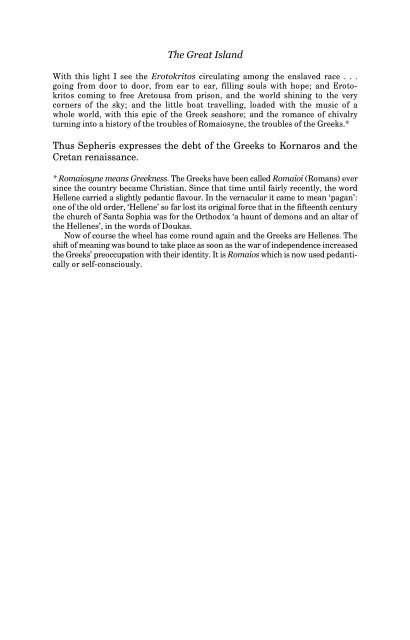free download here - Michael Llewellyn-Smith
free download here - Michael Llewellyn-Smith
free download here - Michael Llewellyn-Smith
You also want an ePaper? Increase the reach of your titles
YUMPU automatically turns print PDFs into web optimized ePapers that Google loves.
The Great Island<br />
With this light I see the Erotokritos circulating among the enslaved race . . .<br />
going from door to door, from ear to ear, filling souls with hope; and Erotokritos<br />
coming to <strong>free</strong> Aretousa from prison, and the world shining to the very<br />
corners of the sky; and the little boat travelling, loaded with the music of a<br />
whole world, with this epic of the Greek seashore; and the romance of chivalry<br />
turning into a history of the troubles of Romaiosyne, the troubles of the Greeks.*<br />
Thus Sepheris expresses the debt of the Greeks to Kornaros and the<br />
Cretan renaissance.<br />
* Romaiosyne means Greekness. The Greeks have been called Romaioi (Romans) ever<br />
since the country became Christian. Since that time until fairly recently, the word<br />
Hellene carried a slightly pedantic flavour. In the vernacular it came to mean ‘pagan’:<br />
one of the old order, ‘Hellene’ so far lost its original force that in the fifteenth century<br />
the church of Santa Sophia was for the Orthodox ‘a haunt of demons and an altar of<br />
the Hellenes’, in the words of Doukas.<br />
Now of course the wheel has come round again and the Greeks are Hellenes. The<br />
shift of meaning was bound to take place as soon as the war of independence increased<br />
the Greeks’ preoccupation with their identity. It is Romaios which is now used pedantically<br />
or self-consciously.


